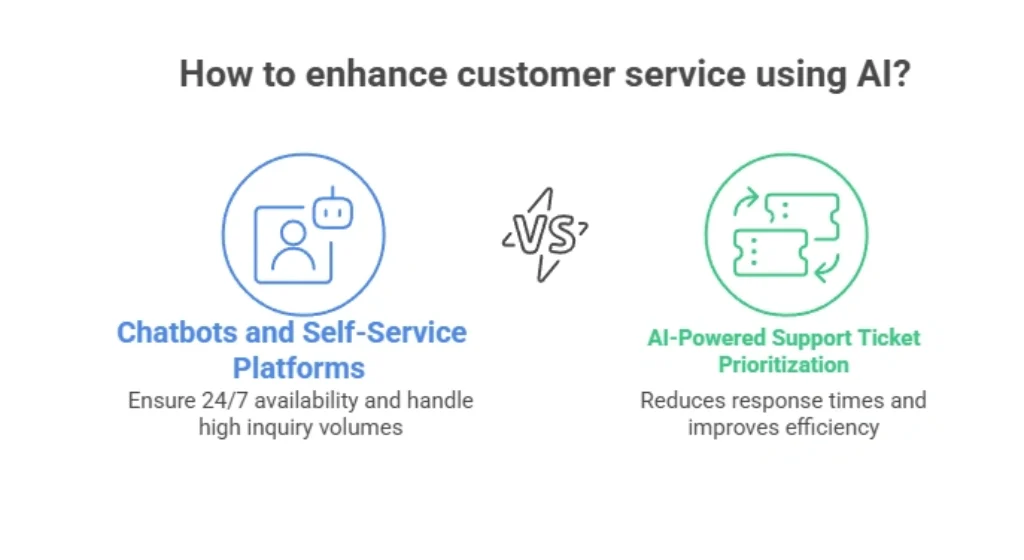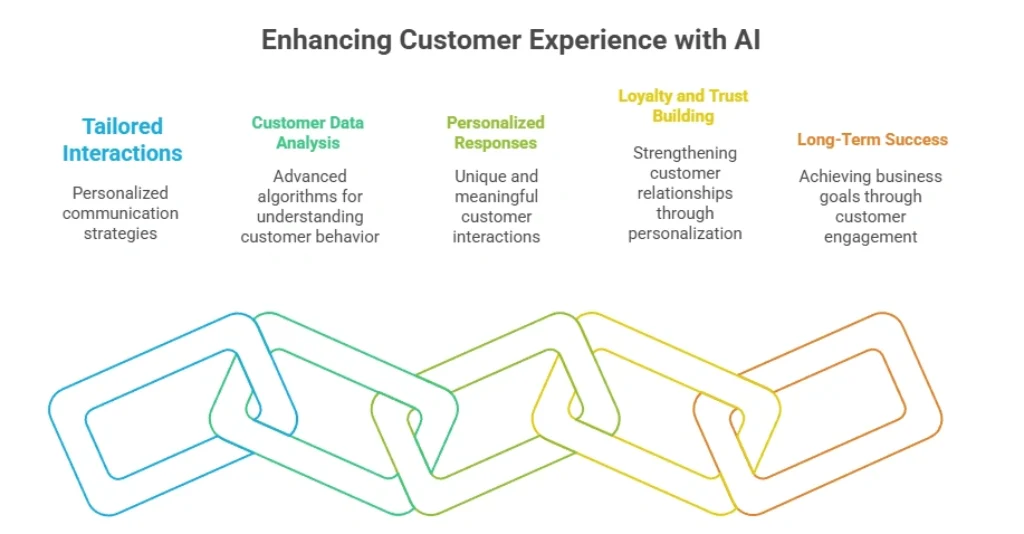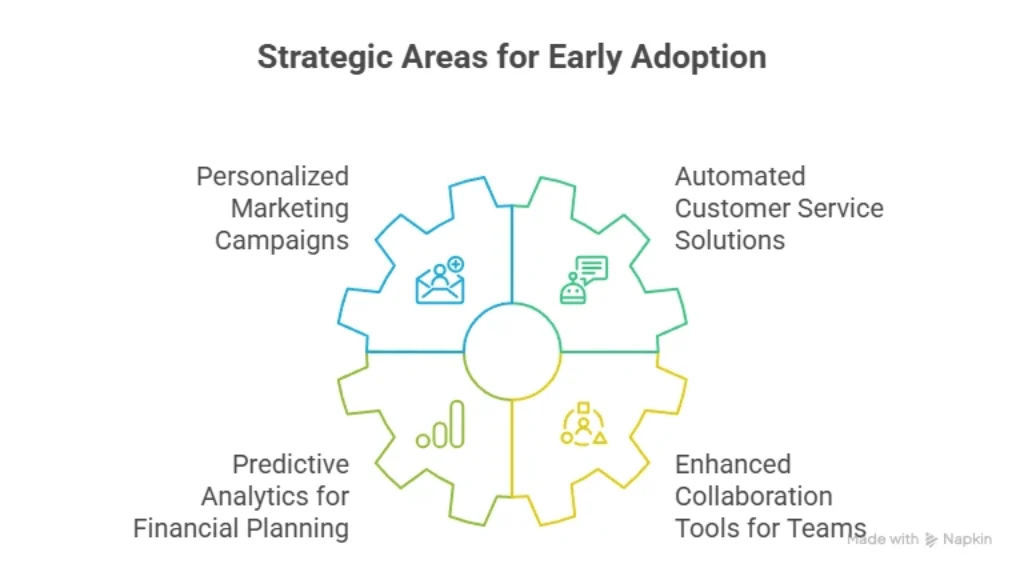Introduction:
Did you know that 98% of small businesses already use Generative AI-enabled tools? If you’re not one of them, you might miss out on a game-changing opportunity. These tools can transform how you operate, engage with customers, and stay competitive in today’s fast-paced market.
From streamlining customer service to boosting team productivity,
AI-powered solutions like CloudTalk and HubSpot are making waves. They’re easy to implement, often taking less than an hour to set up, and deliver measurable results.
Whether it’s reducing manual tasks or enhancing customer interactions, the benefits are undeniable.
This article will guide you through a curated list of the best tools available, along with strategies to help your business grow.
Let’s dive in and discover how you can leverage these innovations to stay ahead of the curve.
Key Takeaways
- 98% of small businesses already use AI-enabled tools.
- AI tools like CloudTalk and HubSpot are easy to implement.
- Streamline operations and enhance customer engagement.
- Boost team productivity and reduce manual tasks.
- Stay competitive with innovative solutions.
Introduction to Generative AI for Small Businesses
Generative AI is reshaping how businesses operate and grow. This technology isn’t just for large corporations—it’s a game-changer for small businesses too.
By automating tasks and enhancing creativity, it’s becoming an essential tool for staying competitive.
Defining Generative AI
Generative AI refers to systems that can create text, images, and even synthetic data on demand.
Unlike traditional AI, which analyzes existing information, it generates new content.
For example, it can draft blog posts, design logos, or produce marketing materials in minutes.
Why Generative AI Matters for Small Business Growth
AI is no longer a luxury—it’s a necessity. Industry data shows it can reduce manual work by up to 83%, freeing your team to focus on high-value tasks.
It also enables round-the-clock customer support, ensuring your business is always available.
These tools simplify content creation, making it easier to produce engaging materials.
Whether it’s crafting emails or designing social media posts, AI ensures consistency and quality.
By automating repetitive tasks, it boosts efficiency and allows you to scale without added stress.
In today’s fast-paced market, adopting AI isn’t just an option; it’s a strategic move.
It enhances customer engagement, streamlines operations, and positions your business for long-term success.
Understanding the Role of Generative AI in Enhancing Customer Experience
In today’s digital age, delivering exceptional customer service is more critical than ever.
AI-powered tools are transforming how businesses interact with their clients, ensuring seamless and personalized experiences.
From round-the-clock support to tailored responses, these innovations are setting new standards in customer engagement.
24/7 Customer Support Benefits
One of the most significant advantages of AI is its ability to provide continuous service.
Tools like chatbots and self-service platforms ensure your business is always available, even outside working hours.
For instance, CloudTalk uses AI to prioritize support tickets based on sentiment and intent, reducing response times by up to 40%.
This not only improves efficiency but also boosts customer satisfaction. By handling high inquiry volumes simultaneously,
AI ensures no query goes unanswered, creating a reliable and responsive experience.

Personalized Customer Engagement
AI excels at delivering tailored interactions.
Platforms like Intercom use advanced algorithms to analyze customer data, enabling personalized responses that resonate with individual needs.
Whether it’s through email or chat, these tools ensure every interaction feels unique and meaningful.
Personalization drives loyalty and trust. By understanding preferences and behaviors, AI helps businesses build stronger relationships with their clients, fostering long-term success.

Boosting Marketing and Sales Using Generative AI
Modern marketing thrives on innovation, and AI is leading the charge. By automating repetitive tasks and enhancing creativity.
These tools are transforming how businesses connect with their audience.
From crafting engaging content to predicting customer behavior, AI is a game-changer for marketing and sales teams.

Content Creation and Optimization
AI simplifies content creation, making it faster and more efficient. Tools like Jasper and HubSpot can generate blog posts, social media updates, and email campaigns in minutes.
This not only saves time but also ensures consistency across all platforms.
These tools also assist in optimizing marketing messages. By analyzing customer data, AI can predict buying behavior and suggest tailored campaigns.
For example, Salesforce Einstein uses predictive lead scoring to identify high-quality prospects, improving conversion rates.
Case studies show impressive results. One e-commerce company saw a 20% increase in average order value after implementing AI for personalized product recommendations.
Another business reduced response times by 80%, boosting customer satisfaction.
AI-powered tools are also cost-effective. They allow small businesses to scale their digital marketing efforts without breaking the bank.
By automating tasks like ad campaign optimization, these solutions maximize ROI and drive growth.
For small business owners, adopting AI isn’t just an option—it’s a strategic move. It enhances customer engagement, streamlines operations, and positions your business for long-term success.
Embrace these tools and watch your marketing and sales efforts soar.
Streamlining Business Operations with AI Tools
AI is revolutionizing how businesses handle daily operations. Automating repetitive tasks frees up valuable time and reduces human error.
For example, tools like QuickBooks Online automate bookkeeping, ensuring accurate financial records without manual input.
Streamlined operations also enhance internal communications. Platforms like Zoom AI Companion simplify scheduling and reporting, making team collaboration seamless.
This integration ensures a smooth workflow across departments, boosting overall efficiency.
AI-powered software excels at operational reporting. It gathers and analyzes data in real-time, providing actionable insights.
This analysis helps businesses make informed decisions, improving both productivity and profitability.
Integrating AI into existing systems is straightforward. Tools like QuickBooks and Zoom work seamlessly with other platforms, ensuring no disruption to your business processes.
This compatibility allows for a smooth transition, even for small companies.
Cost savings are another significant benefit. By automating tasks, businesses reduce operational expenses while maintaining high efficiency.
AI tools are not just a luxury; they’re a necessity for staying competitive in today’s fast-paced market.
Adopting AI is a strategic move for any business. It enhances efficiency, reduces costs, and ensures long-term success. Embrace these tools and watch your operations transform.
Key Features of Top Generative AI Tools
The right tools can transform how businesses operate, and generative AI is at the forefront of this change. These solutions are designed to enhance efficiency, reduce costs, and scale operations seamlessly.
Whether you’re managing customer interactions or creating content, the right technology can make all the difference.
Automation and Efficiency
One of the standout features of generative AI is its ability to automate repetitive tasks. For example, CloudTalk offers automated call summarization, saving hours of manual work.
Similarly, Salesforce Einstein uses predictive analytics to streamline decision-making, ensuring faster and more accurate responses.
These tools also improve accuracy. Grammarly provides real-time writing suggestions, reducing errors and enhancing communication.
By automating these processes, businesses can focus on high-value tasks, boosting overall productivity.

Cost-Effective Scalability
Scalability is another key advantage. Many generative AI solutions are designed to grow with your company.
For instance, Jasper offers flexible pricing plans, making it accessible for businesses of all sizes. This ensures you can expand your operations without significant overhead costs.
Tools like HubSpot also integrate seamlessly with existing systems, reducing the need for costly upgrades.
This cost-effective approach allows small businesses to compete in their industry without breaking the bank.
By leveraging these features, businesses can achieve greater efficiency and scalability, positioning themselves for long-term success.
Exploring the Top Generative AI Tools for Small Businesses
Choosing the right tools can make or break your business’s efficiency and growth.
With so many options available, it’s essential to understand which platforms deliver the most value. Let’s dive into three standout solutions: CloudTalk, HubSpot, and Salesforce.

CloudTalk: Smart Communication Made Easy
CloudTalk is a game-changer for businesses looking to enhance their communication.
Its AI-powered features, like smart notes and transcript search, save time and improve accuracy.
For example, automated call summarization reduces manual work, allowing teams to focus on strategic tasks.
Integration with platforms like HubSpot and Salesforce ensures seamless workflows. This makes it an ideal choice for businesses aiming to streamline customer interactions and boost productivity.
HubSpot: The All-in-One CRM Solution
HubSpot is a versatile platform that combines marketing, sales, and customer service tools. Its CRM features enable businesses to manage leads, track interactions, and personalize customer experiences.
With AI-driven analytics, HubSpot helps predict customer behavior and optimize campaigns.
One small business saw a 20% increase in conversions after implementing HubSpot’s personalized marketing tools.
This demonstrates its potential to drive growth and improve customer engagement.
Salesforce Einstein: Predictive Power for Your Business
Salesforce Einstein brings predictive forecasting to the table, helping businesses make data-driven decisions.
Its AI capabilities analyze trends and identify high-quality leads, improving sales efficiency.
For instance, a retail company reduced response times by 80% using Einstein’s predictive lead scoring.
This tool is perfect for businesses looking to scale operations while maintaining a personalized customer experience.
Each of these tools offers unique strengths. CloudTalk excels in communication, HubSpot provides an all-in-one CRM, and Salesforce Einstein delivers predictive insights.
By understanding their features, you can choose the right platform to meet your business needs.

Leveraging Generative AI for Financial Management and Forecasting
Financial management is evolving rapidly, and AI is at the heart of this transformation.
From automating bookkeeping to predicting cash flow, these tools are reshaping how businesses handle their finances.
With accurate analysis and real-time insights, companies can make smarter decisions and reduce risks.
Automated Bookkeeping Solutions
AI-powered tools like QuickBooks Online are revolutionizing bookkeeping.
They automatically categorize expenses, reconcile accounts, and generate detailed reports.
This reduces manual errors and saves time, allowing businesses to focus on growth.
For example, QuickBooks uses intelligent systems to track transactions and provide actionable information. This ensures financial records are always up-to-date and accurate.
By automating repetitive tasks, companies can streamline their workflow and improve efficiency.
Cash Flow and Expense Forecasting
Predicting cash flow is crucial for proactive budget management. AI tools analyze historical data to forecast future trends, helping businesses plan.
This reduces financial risks and ensures stability.
QuickBooks Online’s cash flow prediction feature is a game-changer. It provides real-time insights into expenses and revenue, enabling quick, data-driven decisions.
This level of accuracy supports business growth and long-term success.
These tools are also accessible for companies with limited budgets.
By leveraging AI, small businesses can achieve financial clarity without significant cost.
This makes advanced financial management achievable for everyone.
Integrating Generative AI into Existing Business Workflows
Integrating AI into your business doesn’t have to be complicated. With the right strategies, you can seamlessly blend new tools with your current systems.
This ensures a smooth workflow and maximizes efficiency.
Seamless System Integration Strategies
Start by ensuring compatibility between your existing software and new AI tools. Many providers offer demo sessions to verify how well their solution fits your needs. This step minimizes disruptions and ensures a smooth process.
APIs and cloud-based platforms play a crucial role in simplifying integration.
For example, tools like Google Cloud AI use APIs to connect with other systems effortlessly. This reduces the need for complex code and speeds up implementation.
Small businesses have successfully integrated AI by starting with pilot programs.
One company used a phased rollout to test AI-powered customer support tools.
This approach allowed them to address challenges early and scale gradually.
Common challenges include data compatibility and employee training. To overcome these, seek technical support from your AI provider.
Additionally, plan a phased rollout to minimize disruptions and ensure a smooth transition.
By following these strategies, you can integrate AI into your business effectively. This not only enhances efficiency but also positions your company for long-term success.
Empowering Teams with AI-Driven Training and HR Solutions
Teams are finding new ways to thrive with AI-driven solutions. From recruitment to ongoing training, these tools are reshaping how businesses manage their workforce.
By automating repetitive tasks and offering personalized insights, AI is making HR processes more efficient and effective.

Streamlining Recruitment and Employee Training
AI is revolutionizing recruitment by automating candidate screening.
Tools like Workable use natural language processing to analyze CVs, ensuring unbiased decision-making.
This reduces hiring time and improves the quality of hires.
Employee training is also benefiting from AI. Platforms like Lingio create customized programs based on individual performance.
For example, one company reduced course development time from hours to seconds, achieving a 12x higher completion rate.
Boosting Team Productivity and Engagement
AI tools are enhancing team productivity by automating administrative tasks. Leapsome uses data analysis to predict employee turnover, helping businesses take proactive steps to retain talent.
This ensures a more engaged and motivated workforce.
Success stories highlight the impact of AI. A retail company improved teamwork by 30% after implementing AI-powered training tools.
These solutions not only save time but also foster a culture of continuous learning and growth.
By leveraging AI, businesses can empower their teams to achieve more.
From streamlined recruitment to tailored training, these tools are driving efficiency and engagement across the board.
Maximizing ROI Through Generative AI Adoption
Adopting AI can significantly boost your business’s bottom line.
By automating repetitive tasks, companies report up to an 83% reduction in time spent on manual work.
This efficiency translates into measurable cost savings and allows teams to focus on high-impact areas.
For example, a retail chain saw a 20%increase in average order value after implementing AI-driven personalized recommendations.
Another business reduced administrative expenses by 30%, freeing up resources for growth initiatives.
These data-driven examples highlight the tangible benefits of AI adoption.
Measuring ROI is straightforward with tools like OpenAI. Improved productivity metrics, such as faster response times and higher conversion rates, provide clear insight into AI’s impact.
Case studies show that companies often see returns within 6-12 months, depending on project complexity.
Experts recommend a cautious yet optimistic approach. Start with pilot programs to test AI tools and gather data. This strategy minimizes risks while maximizing long-term gains.
By reinvesting savings into new technologies, businesses can sustain growth and stay competitive.
AI isn’t just a trend; it’s a strategic investment. With the right tools and planning, your business can achieve significant ROI and thrive in today’s fast-paced market.
Case Studies and Real-World AI Success Stories
Real-world examples show how AI is transforming small businesses. From customer service to financial management, these tools are driving efficiency and innovation.
Let’s explore some inspiring success stories and the lessons they offer.
Customer Service Excellence with CloudTalk
CloudTalk’s AI-powered features have revolutionized customer service for small businesses.
One retail company saw a 40% reduction in response times after implementing its automated call summarization.
This tool not only saved hours of manual work but also improved customer satisfaction.
Another example is a small e-commerce business that used CloudTalk to prioritize support tickets. By analyzing sentiment and intent, they achieved a 30% increase in customer retention.
These results highlight the power of AI in enhancing customer interactions.
Marketing Success with HubSpot
HubSpot’s CRM tools have been a game-changer for small businesses. A case study of a retail company shows a 20% increase in conversions after implementing HubSpot’s personalized marketing tools.
The platform’s AI-driven analytics helped predict customer behavior and optimize campaigns.
Research indicates that businesses using HubSpot reduce administrative tasks by up to 50%.
This allows teams to focus on high-value activities, driving growth and efficiency.
Financial Management with Salesforce Einstein
Salesforce Einstein has transformed financial management for small businesses.
One company reduced response times by 80% using its predictive lead scoring.
This tool provided valuable insight into customer behavior, improving decision-making and profitability.
Another example is a small bakery that used Salesforce Einstein to optimize inventory management.
By analyzing past sales data, they reduced waste by 30% and improved cash flow.
These results demonstrate the versatility of AI in financial operations.
Open-source platforms like GitHub also offer AI solutions for small businesses.
These tools are cost-effective and scalable, making them accessible for companies with limited budgets.
In summary, these success stories provide actionable strategies for replicating AI-driven success.
By leveraging tools like CloudTalk, HubSpot, and Salesforce, small businesses can achieve remarkable results and stay competitive in today’s market.
Addressing Challenges and Risks in Generative AI Implementation
Implementing AI in your business comes with its own set of challenges and risks.
While the benefits are undeniable, it’s essential to address potential hurdles to ensure a smooth transition.
From data privacy concerns to technical difficulties, understanding these issues can help you make informed decisions.
Data Privacy and Security Concerns
One of the most pressing issues is data privacy. Experts stress the importance of safeguarding sensitive information when using AI tools.
For example, 50% of businesses cite security concerns as a key reason for hesitating to adopt AI.
This risk is particularly relevant for small businesses that may lack a robust IT infrastructure.
To mitigate these concerns, carefully review vendor contracts and ensure compliance with regional privacy laws.
Tools like Google Cloud AI offer built-in security features, providing an extra layer of protection.
By prioritizing data privacy, you can build trust with your customers and avoid potential legal issues.
Overcoming Implementation Hurdles
Another common challenge is the technical and educational barriers to AI adoption.
Many businesses struggle with integrating new tools into their existing processes.
For instance, 32% of companies cite a lack of knowledge about AI suppliers as a major obstacle.
Start with a phased rollout to test AI tools and gather feedback. Training programs can also help your team understand how to use these solutions effectively.
Platforms like HubSpot offer user-friendly interfaces and tutorials, making the learning process easier.
By addressing these hurdles proactively, you can maximize the benefits of AI while minimizing disruptions.
A balanced approach ensures your business stays competitive in today’s fast-paced market.

Future Trends in Generative AI for Small Businesses
The future of business innovation is being shaped by emerging technologies. As generative AI continues to evolve, it offers exciting opportunities for small businesses to stay ahead.
From advanced models to deeper integration, these trends are set to transform operations and customer experiences.
Emerging Technologies and Market Opportunities
One of the most significant advancements is the rise of multimodal models. Tools like Gemini combine text, images, and data to create more comprehensive solutions.
This technology enables businesses to generate richer content and improve decision-making.
Natural language processing is also becoming more sophisticated. This allows for more accurate and personalized customer interactions.
For example, chatbots can now understand context better, providing more meaningful responses.
Market opportunities are expanding as AI becomes more accessible. Small businesses can leverage these tools to compete with larger enterprises. Early adopters will gain a competitive edge by integrating these innovations into their workflows.
Experts predict a shift in the industry landscape as AI becomes more pervasive. Businesses that remain agile and innovative will thrive.
Staying updated on the latest insights and trends is crucial for long-term success.
Here’s a quick list of strategic areas for early adoption:
- Personalized marketing campaigns
- Automated customer service solutions
- Predictive analytics for financial planning
- Enhanced collaboration tools for teams
By embracing these trends, small businesses can unlock new levels of efficiency and growth.

The key is to stay informed and proactive in evaluating emerging tools.
Conclusion
Adopting innovative solutions can transform how businesses operate and grow. From streamlining operations to enhancing customer experiences, these tools offer measurable benefits.
Real-world cases show how companies achieve efficiency and scalability by leveraging advanced technologies.
While challenges like data privacy and integration exist, the insight gained from expert analyses provides a clear path forward.
Staying informed about emerging trends ensures your team remains competitive in a fast-paced market.
Exploring the tools discussed in this article is a great starting point. Consider a trial to experience firsthand how they can drive growth.
With the right suggestion and approach, your business can unlock new opportunities and achieve sustainable success.
Take the next step today. Embrace innovation and position your business for long-term growth.
FAQ
Q: What is generative AI, and how can it help my small business?
A: Generative AI is technology that creates content, such as text, images, or code, based on input data. It can enhance customer experience, streamline operations, and boost marketing efforts, making it a valuable tool for growth.
Q: How does AI improve customer support for small businesses?
A: AI-powered tools like chatbots provide 24/7 customer support, ensuring quick responses to inquiries. This improves customer satisfaction and frees up your team to focus on other tasks.
Q: Can AI tools help with content creation for marketing?
A: Yes, platforms like HubSpot and OpenAI’s ChatGPT can generate high-quality text, optimize content, and suggest ideas, saving time and improving marketing campaigns.
Q: What are the key features to look for in generative AI tools?
A: Look for automation capabilities, cost-effective scalability, and seamless integration with your existing workflows to maximize efficiency and ROI.
Q: How can AI assist in financial management for small businesses?
A: AI tools automate bookkeeping, forecast cash flow, and analyze expenses, providing insights to help you make informed financial decisions.
Q: What challenges might I face when implementing AI in my business?
A: Common challenges include data privacy concerns, security risks, and integration hurdles. Planning and choosing the right tools can help overcome these issues.
Q: Are there real-world examples of small businesses benefiting from AI?
A: Yes, many businesses use AI for tasks like personalized marketing, automated customer service, and streamlined operations, which increases productivity and revenue.
Q: What future trends should small businesses watch in generative AI?
A: Emerging technologies like advanced natural language processing and image generation tools offer new opportunities for innovation and market growth.
Q: How can I integrate AI into my existing business workflows?
A: Start by identifying areas where AI can add value, such as customer service or content creation. Choose tools that integrate smoothly with your current systems for a seamless transition.
Q: Is AI adoption cost-effective for small businesses?
A: Many AI tools are affordable and scalable, offering significant ROI by reducing manual labor, improving efficiency, and enhancing customer engagement.
Source Links
- The 15 Best AI Tools for Small Businesses and How to Use Them – https://blog.hubspot.com/sales/small-business-ai-tools
- Top 14 AI Tools for Small Businesses: Tips and Best Practices – CloudTalk –https://www.cloudtalk.io/blog/ai-for-small-business/
- AI for Small Businesses | IBM –https://www.ibm.com/think/insights/ai-for-small-business
- The AI Boom: Practical Guide to Generative AI for Small Businesses | Towards AI –https://towardsai.net/p/l/the-ai-boom-practical-guide-to-generative-ai-for-small-businesses
- How Does Generative AI Improve Customer Experience |Sprinklr –https://www.sprinklr.com/blog/generative-ai-customer-experience/
- Generative AI’s Potential to Improve Customer Experience –https://www.bain.com/insights/generative-ai-potential-to-improve-customer-experience/
- 6 generative AI tools to consider for marketing and sales | TechTarget –https://www.techtarget.com/searchcustomerexperience/tip/Generative-AI-tools-to-consider-for-marketing-and-sales


